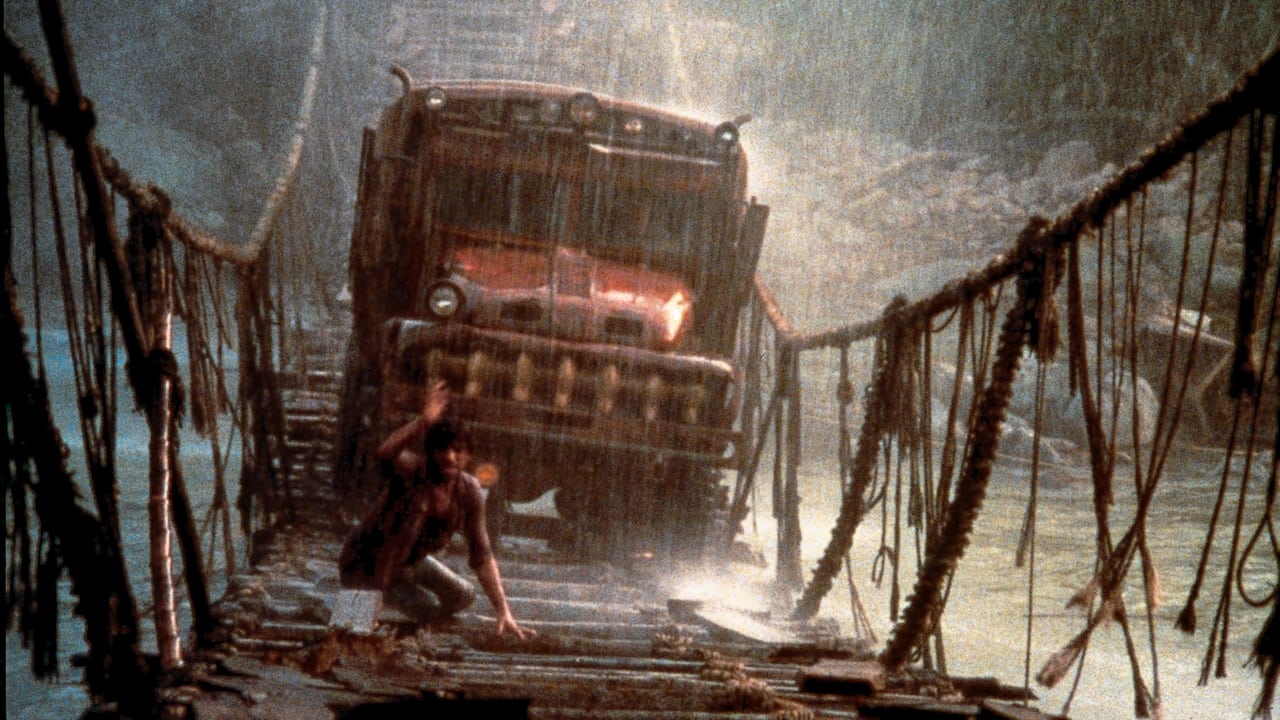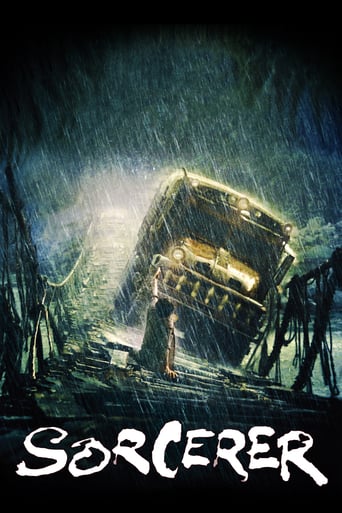



Truly Dreadful Film
Slow pace in the most part of the movie.
Your blood may run cold, but you now find yourself pinioned to the story.
View MoreWhile it doesn't offer any answers, it both thrills and makes you think.
View MoreAfter The Exorcist (1973), William Friedkin's next film was this big budget remake of the French-Italian classic thriller The Wages of Fear (1953). Unfortunately, it was released after Star Wars (1977) and Smokey and the Bandit (1977), two movies that dominated the box office and solidified "the summer blockbuster season" that Jaws (1975) had established. Ironically, this feature - like that one - also stars Roy Scheider. But surely it was the ill-chosen title - which beckons the director's last effort - that doomed this one to obscurity that year.Fortunately upon further review, Sorcerer (1977) - which earned an Academy Award nomination for its Sound (the Oscar won by Star Wars) - has rightly received the recognition it deserves among cinephiles who, while all might not agree that it's superior to the original, mostly consider it an overlooked masterpiece.The updated narrative spends considerably more time setting the stage for the perilous journey - four desperate men transporting nitroglycerin over 200 miles in trucks - than the original, in which Yves Montand's Mario merely describes the situation to "Mr. Jo", largely the focal point of director Henri-Georges Clouzot's film. Instead, the background, character and motivations of three of the four are shown before each arrives in the dead end South American town that's dependent on a US Oil Company. Ironically, Friedkin spends almost no time establishing Nilo, the Mr. Jo character in this one.Given the budget, the special effects are excellent, making the difficult nature of the trip more visceral, but this is somewhat at the expense of the psychological challenges - internal to each and external between them - that are more fully probed in the original. But Friedkin was obviously a fan of The Wages of Fear (1953) because he nods to it, and ties up its loose ends, making sense of elements that were missing or left to the imagination by Clouzot.
View MoreI don't think I'll be able to review William Friedkin's 'Sorcerer' without comparing it to Henri-Georges Clouzot's 'The Wages of Fear' since both are adaptations of Georges Arnaud's novel. Both the films are similar in structure. They are both divided into two respective halves. In the first half we get to know about the characters and in the second half we follow them in their thrilling adventure. However there is a marked difference in the way the two filmmakers make us familiar with the characters. Clouzot's film starts off with all the characters already in exile in the South American country and we get to know about them through their interactions with each other. Friedkin takes a different route. In 'Sorcerer' we get extended individual flashbacks of the major characters to convey the reasons behind their exile in an unknown country which actually works very well. Friedkin also does very well to capture the morbid and monotonous nature of life that the primary group of characters have to lead in Porvenir. Then the second half commences and the differences in directorial styles become even more apparent. Although the theme of desperate men willing to go to any lengths to achieve freedom from their present pointless existence is present in both films, but the style of execution of the set-pieces in the two films differ. There is a surgical precision to Clouzot's set-pieces. He uses meticulous editing to create Hitchcock-esque tension as we watch the characters solve problems and overcome obstacles with deduction, logical planning and presence of mind. Friedkin stays true to his creative roots and quite akin to 'The French Connection' and 'The Exorcist', what we get in the second half of 'Sorcerer' is unflinchingly visceral. Instead of prioritising tension and suspense, Friedkin makes the group's mission a 'Man versus Nature' struggle. The set- pieces are not about tension, but about showing these men getting constantly beaten down by nature's forces. Their only ally is perseverance and mental strength. One can't help but get reminded of Werner Herzog(and especially 'Aguirre: The Wrath of God' due to the jungle setting) because of Friedkin's choice to showcase nature in its most merciless, brutal and unforgiving light. Roy Scheider's character could easily be a protagonist in a Herzog film because of his unflinching persistence in trying to overcome nature at all cost and this persistence leads to hysterical paranoia which is again not uncommon in Herzog's protagonists. 'Sorcerer' retains the darkly humorous irony of 'The Wages of Fear'. I have to say that both the films are equally good in their respective ways and deserve recognition.If there is anything wrong in 'Sorcerer', it's that the transition from one mood/tone to another at times is a bit abrupt and clumsy. But in the overall context, it is a very minor complaint. Highly recommended.
View MoreFour unfortunate men from different parts of the globe agree to risk their lives transporting gallons of nitroglycerin across dangerous South American jungle.As others have noticed, this film suffers from having a strange title. The original book is "The Wages of Fear", and the film was released under this title in some territories. I suspect that if it had this title today, it might be better remembered. A name like "Sorcerer" clearly suggests a fantasy film, which this is not.That major hurdle aside, it is a good movie and a very ambitious one. With four different prologues, a casual viewer might gt lost or bored or just not know what to think. It pays off as the story progresses, however, and we get a film that is a war movie, a mob movie, an action thriller... it has a little something for everyone.
View MoreCertainly this Film, a Disappointment to Fans and Critics upon its Initial Release, has Gained a Following and Devotees of the Director and Film Connoisseurs are now Rewarded with a Pristine Blu-ray Release and its Grueling Gruesome Glory is now Evident for all to Witness.It's a Realistic, Beautifully Shot, display of Corporate Ugliness. An Energetic Movie with the Demanding Director at His Best. It Ranks with His "The Exorcist" (1973) and "The French Connection" (1971) as one of the Best Films of the 1970's. Friedkin Considers it His Most Accomplished Work.Accomplished, For Sure. He and the Crew Suffered Greatly bringing this Masterpiece of the Surreal to the Screen. A Film Craftsman at Work that Sweated and Labored to bring His Vision Home in all of its Grimy and Gritty Glory.Films Like "Aguirre, the Wrath of God" (1972) and "Apocalypse Now" (1979) are Infamous concerning the Trials and Excesses of Possessed Directors and this one Reminds of both. It had a Hubris of Hollywood Success Paving the Way for Friedkin to let loose and take almost Dictatorial Control of the Project. What Results is a Crackling and Visceral Descent Into Hell for the Criminal Characters and the Audience. Analogous and Angry and at times a totally Unwashed Display of Capitalism's Control Over Third-World Countries and Their Despairing Populace. One of the Greatest Unknown, Unseen Films ever. Roy Scheider and an International Cast all Add to the Film's Otherworldly and Etherical Appeal. Although it's Not an Appealing Film in a Lot of Ways by Design. The Film is a Sweaty, Bleak, and Horrific View of Desperate People Caught in a Limbo of Barely Survival Conditions. See this Forgotten Film to See who Survives. It's Not a Very Pretty Picture but the Movie is One Pretty Picture if You can Call Hell a Pretty Picture.
View More